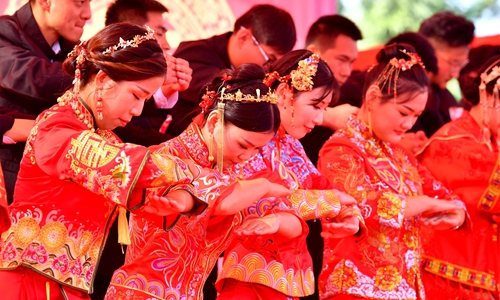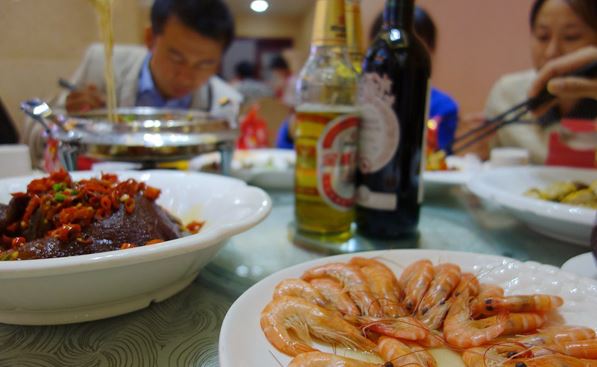
From the People's Daily App.
This is Story in the Story.
China is aiming to reform rural customs of extravagant weddings and funerals.
Many grassroots officials and governments have vowed to guide residents across China in changing extravagant weddings and luxury feasts for funerals as China begins curbing outdated conventions in rural areas.
Officials have called for policies to fit local conditions and to avoid a "one size fits all" policy.
Eleven ministries and departments, including China's Ministry of Agriculture and Rural Affairs have jointly released a guideline on pushing for changes of outdated conventions and deeds in rural areas within three to five years.
The guideline lists the general requirements for the efforts and expounds on major measures, including making sure primary-level Party organizations in rural areas fulfill their duties in guiding residents to change outdated conventions.
Today’s Story in the Story looks at moves being made to make weddings and funerals more affordable for less affluent people in rural parts of China.

Twenty-two couples have a group wedding without a bride price in Shangqiu, Central China's Henan Province in September, 2018. (Photo: VCG)
Many villagers in China's rural areas have long been burdened by various cumbersome and costly customs, such as paying large sums of money for bride prices, holding funeral rites with hired strippers and luxury feasts. Villagers struggle, but participate to maintain their social standing, or risk losing mianzi - loosely translated to "face" in English, analysts said.
Bride prices, a traditional prerequisite for marriage, are increasingly becoming a miserable burden for families in rural areas across China as it has spiked sharply in recent years.
The groom's parents usually give money to their in-laws-to-be, either to secure a happy marriage or to display the family's wealth to others. In recent years, expectations for betrothal money have increased, imposing a huge financial burden on the groom's family, said Xu Youlin, an official from the Shangrao government in East China's Jiangxi Province.
"The price often ranges from 180,000 yuan ($25,572) to 280,000 yuan although the average rural family has an annual per capita income of just over 10,000 yuan," said Xu, noting that the man's family could not afford it, so they had to borrow money.
In addition to bride prices and banquets, other events, such as hiring strippers when holding funeral rites, are widely regarded as bad behavior.
Many villagers are not willing to follow such practices, but they find it difficult to make a change due to pressures from others. Some outdated customs are against the traditional virtues of Chinese society, said Zhu Wei, a professor at the China University of Political Science and Law.

People attend a wedding banquet in Chenzhou, Hunan province. (Photo: VCG)
"Those costly customs have become huge burdens for many rural residents and they also made bad social influence," said Han Jun, vice-minister of agriculture and rural affair.
The efforts on changing outdated conventions should also fully respect local customs throughout the country and take the preferences of the people into consideration while avoiding compulsive or rigid measures in the process, said Han.
"I don't think all the old rural customs are trash. Some have an inheritance of local civilization," said a public servant surnamed Liu in Haikou, South China's Hainan Province.
In Feixiang district of Handan, Hebei province, authorities have been trying to reverse the trend of extravagance.
After consultation, villagers in all the district's 265 villages set standards for hosting weddings and funerals, including the number of banquet tables and cars, and procedures for ceremonies, according to Li Shuping, head of the district.
Village officials have been asked to take the lead and observe thrift in hosting such events, he said.
With these efforts, villagers' expenditures on various events have been greatly reduced, which has also won their applause, Li said.
Other provinces, including Henan and Gansu, have established rules or standards regarding marriage and funeral customs.
In addition, there could be a nationwide crackdown on such extravagant customs after a suggestion on the development of rural areas released by the Communist Party of China Central Committee and the State Council in February described such customs as unhealthy social trends.
(Produced by Nancy Yan Xu, Brian Lowe, Lance Crayon and Paris Yelu Xu. Music by: bensound.com. Text from Global Times and China Daily.)


